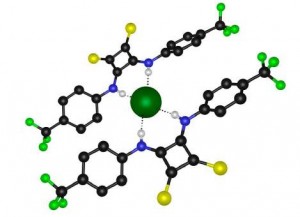Many diseases are caused by faulty anion transport across cell membranes, such as faulty chloride transport leading to cystic fibrosis. Therefore, in recent years interest has grown in developing small molecule mimics of transport proteins that can be used to restore or disrupt the chemical processes within cells and thus cure or kill a range of diseases.
Researchers from the University of Southampton and the University of Sydney have produced a series of thiosquaramides which investigate pH dependent chloride transport properties. It was observed that the anion transport ability of the thiosquaramides was completely turned on below a pH of 7.2 but fully switched off at a pH value of 7.2 or higher. The developed thiosquaramides can promote chloride efflux mainly via a chloride/nitrate antiport process.
One of the thiosquaramide derivative with bound chloride anion
This paper provides one of the few examples of truly controllable and switchable anion transport by small synthetic molecules. Thiosquaramides form interesting targets for developing future biologically active anion transporters – read the paper today to find out how to make them!
To read the details, check out the Chem Sci article in full for free:











